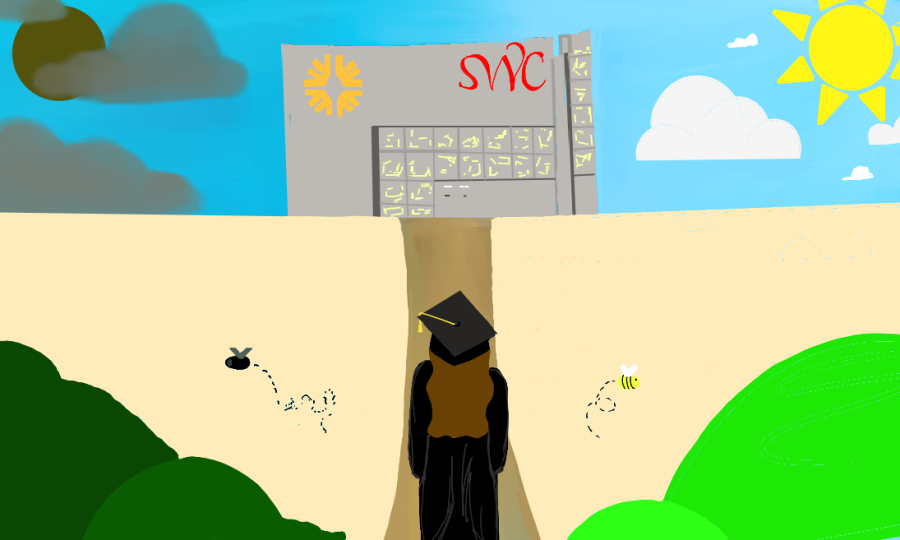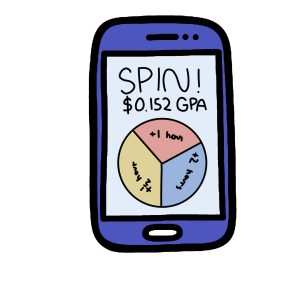An alternate path
Considering community colleges for post-graduation plans
May 8, 2022
When high school students decide whether they are going to college or not, they do not always consider pursuing community college. Just like any other college, there can be challenging aspects, but community colleges can also benefit students.
“There are lower costs for tuition and fees especially with the California College Promise Grant (CCPG), where the first two years of community college are free, provided that the student completes and submits the FAFSA (Federal Application for Federal Student Aid),” Scholarship Counselor, Reynila Calderon-Magbuhat said.
Calderon-Magbuhat explains how the CCPG “provides financial relief for families”. Additionally, community college can help students get a better Grade Point Average (GPA) than what they graduated highschool with.
“They can also improve their GPA in community college before transferring to a four year college or university,” Calderon-Magbuhat said. “Students also have the opportunity to explore different courses through their GE’s (general education credits) before declaring a major.”
If students are unsure of their major in community college, they are able to experiment with the different courses available to them. When a student decides to switch majors in community college, it would not cost as much compared to if they switched in a University College (UC) or California State University (CSU).
“There was a couple of majors that I was bouncing between. That also contributed to why community college is so appealing because changing majors at a four year [college] can cost a lot of time and money. Whereas a community college is typically an easier transition,” Bonita Vista High (BVH) Alumni Gerardo González said.
González is currently in his second semester at Southwestern College (SWC). He found that students at community college have “more freedom” if they decide to change their major. González also mentions how it is easier to be a part of different communities on campus.
“It’s very easy to be involved on campus. It’s easy to start a club [and] join public learning communities on campus because everyone is so approachable. I know from experience and friends have told me that’s not always the case for four year [colleges]. So I’d say those are some of the biggest advantages,” González said.
BVH senior Ingrid Alcantara also shared an advantage to community college, as she is going to attend San Diego Mesa College in a couple of months.
“It’s really close to [BVH], but farther away from Southwestern College. It’s in Claremont so it’s kind of close to UC San Diego (UCSD) so I can still visit my friends,” Ingrid Alcantara said.
Alcantara not only chose community college to stay close to her friends and family, but also for her major, architecture. The UC and CSU schools are “very limited in architecture” and the college she got into, University of Hawai’i at Mānoa is far away. Alcantara compromised by going to a community college that has resources in Architecture. However, BVH senior Tannya Meza chose to attend San Diego State University (SDSU) instead of a community college because of her major.
“The biggest reason why I didn’t choose community college was because there aren’t very many that offer nursing programs,” Meza said.
If nursing was not the major she wanted to pursue, Meza would have chosen to attend community college because it is more affordable.
“There are a lot of opportunities I can get from going to community college,” Meza said. “Although, I think I would rather still go to a university because I know that transferring from a community college to university can become hard sometimes.”
Similar to Meza, González mentions how it is harder to figure out the classes you should be taking to get the degree you are working towards when you transfer from a community college to another university.
“I think a pretty big challenge is figuring out what the next step is,” González said. “If you go to a four year [college], the counselor will know exactly what classes you need to take for the degree. In community college it will vary by the school you want to transfer to, so it’s not as easy to figure out.”
As explained by González, the counselors won’t easily have the previous classes you took at community college along with the one you will need to take at the new college. An additional challenge that corresponds with the one Meza and González stated is how difficult it is for students to manage time effectively.
“Progress may be slow if students are not attending full time and/or are working while attending school. That can prolong the amount of time spent at a community college,” Calderon-Magbuhat said. “I would advise students to get to know their college counselors, and get advice on how to complete your GE’s in a timely manner before transferring to a university. If a student is not university bound, then they should complete a course certification in a career program.”










